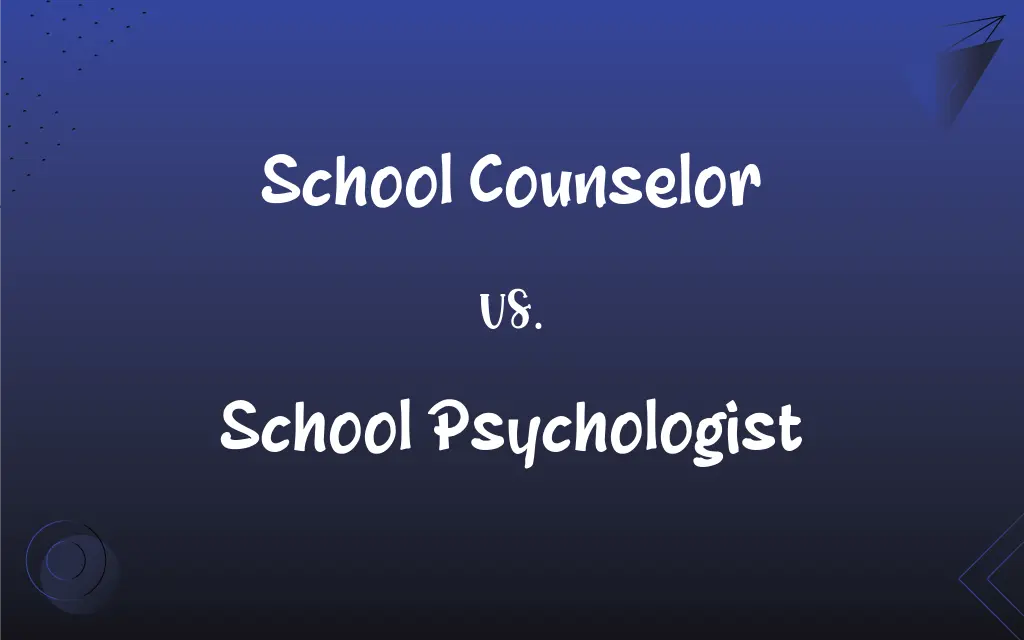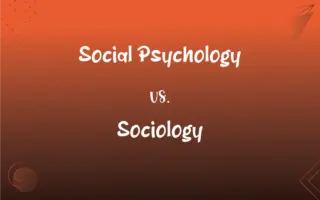School Counselor vs. School Psychologist: What's the Difference?
Edited by Janet White || By Harlon Moss || Updated on October 19, 2023
A school counselor focuses on students' academic, personal, and social needs, while a school psychologist assesses and supports students' psychological and educational needs.

Key Differences
A school counselor is a professional who assists students in their academic, personal, and social development within the educational environment. Their primary objective is to promote and enhance student success by offering guidance on academic pathways, career opportunities, and personal issues. On the other hand, a school psychologist's role delves deeper into the psychological needs of students, evaluating their mental and emotional health, and providing appropriate interventions when necessary.
School counselors are adept at helping students navigate challenges such as course selection, college preparation, or interpersonal conflicts. They may lead group sessions, offer one-on-one guidance, or provide resources to students and parents. In contrast, a school psychologist is trained to conduct psychological assessments, understand behavioral disorders, and collaborate with educators and families to develop individualized education plans (IEPs) for students with special needs.
The training for a school counselor typically includes a master's degree in counseling or a related field, emphasizing developmental psychology, educational guidance, and counseling techniques. Conversely, a school psychologist usually possesses an advanced degree, often a doctoral degree, in school psychology, which equips them with skills in psychological assessment, intervention strategies, and research methodologies.
While both professionals work collaboratively to ensure students' well-being, a school counselor's approach tends to be more preventative, providing resources and guidance before issues escalate. A school psychologist, meanwhile, often steps in when there are evident psychological or behavioral concerns, using their specialized training to address and support students' specific needs.
Comparison Chart
Primary Focus
Academic, personal, and social development.
Psychological and educational assessment and intervention.
ADVERTISEMENT
Typical Activities
Career guidance, academic counseling, conflict resolution.
Conducting assessments, developing IEPs, behavioral interventions.
Educational Requirement
Master's degree in counseling or related field.
Often a doctoral degree in school psychology.
Main Approach
Preventative guidance and resources.
Specialized interventions for psychological or behavioral concerns.
Collaboration
Work with teachers, parents, and students directly.
Collaborate with educators, families, and other professionals.
School Counselor and School Psychologist Definitions
School Counselor
An expert in student development within the school setting.
The school counselor helped Jake with his course selection.
ADVERTISEMENT
School Psychologist
A trained individual in understanding student behavior.
The school psychologist introduced a program for emotional regulation.
School Counselor
A mentor assisting students in navigating school challenges.
The school counselor introduced a new anti-bullying program.
School Psychologist
A specialist providing interventions for behavioral concerns.
After the incident, he was referred to the school psychologist.
School Counselor
An educator focusing on students' overall well-being.
The school counselor organized a workshop on stress management.
School Psychologist
A collaborator in creating conducive learning environments.
The school psychologist worked with teachers to support students with ADHD.
School Counselor
A specialist in academic advising and personal counseling.
After their argument, both students were sent to the school counselor.
School Psychologist
A professional assessing students' psychological needs in schools.
The school psychologist evaluated Emily's learning challenges.
School Counselor
A professional guiding students in academic and personal growth.
Sarah visited the school counselor to discuss her college options.
School Psychologist
An expert in educational and psychological assessments.
The school psychologist determined that he needed an IEP.
FAQs
How does a school psychologist differ?
A school psychologist assesses and addresses students' psychological and educational needs.
What's the main role of a school counselor?
A school counselor supports students' academic, personal, and social development.
Do school counselors offer therapy?
While they offer guidance, they don't provide deep therapeutic interventions like clinical therapists.
Do all schools have both professionals?
Not necessarily. It varies by school and district resources and needs.
Can a school psychologist diagnose disorders?
Yes, they're trained to diagnose educational and psychological disorders.
What training does a school counselor have?
Typically, a master's degree in counseling or a related field.
How do the roles overlap?
Both prioritize student well-being but approach it differently, with counselors on guidance and psychologists on intervention.
Do school counselors help with college applications?
Yes, they often guide students through college and career planning.
How about a school psychologist's education?
Often a doctoral degree in school psychology or a related field.
Are school psychologists only for students with special needs?
While they often work with such students, their expertise benefits the entire student population.
Can a school psychologist help with learning strategies?
Absolutely, they can suggest strategies based on a student's psychological and educational profile.
How do school counselors address bullying?
They provide resources, programs, and direct mediation between students.
Can parents meet with the school counselor?
Yes, parents often meet with school counselors to discuss their child's progress or concerns.
When should a student see a school psychologist?
When there are significant behavioral, emotional, or academic concerns that might require specialized assessment or intervention.
Do school psychologists only work in schools?
While specialized for schools, some also work in private practice or other educational settings.
How does a school counselor help with academic planning?
They guide course selection, college prep, and provide resources for academic success.
Are school psychologists involved in IEP development?
Yes, they play a crucial role in assessing needs and recommending accommodations.
Can a school psychologist counsel students?
They can provide short-term support but mainly focus on assessment and intervention.
Do these professionals collaborate?
Yes, they often work together to ensure comprehensive student support.
Can a school counselor help with personal issues?
Yes, they offer support for a range of personal and social challenges students face.
About Author
Written by
Harlon MossHarlon is a seasoned quality moderator and accomplished content writer for Difference Wiki. An alumnus of the prestigious University of California, he earned his degree in Computer Science. Leveraging his academic background, Harlon brings a meticulous and informed perspective to his work, ensuring content accuracy and excellence.
Edited by
Janet WhiteJanet White has been an esteemed writer and blogger for Difference Wiki. Holding a Master's degree in Science and Medical Journalism from the prestigious Boston University, she has consistently demonstrated her expertise and passion for her field. When she's not immersed in her work, Janet relishes her time exercising, delving into a good book, and cherishing moments with friends and family.































































